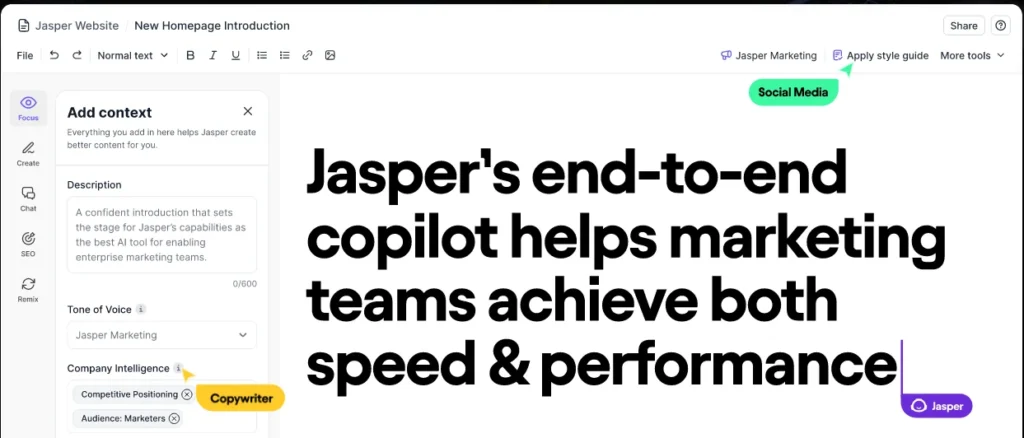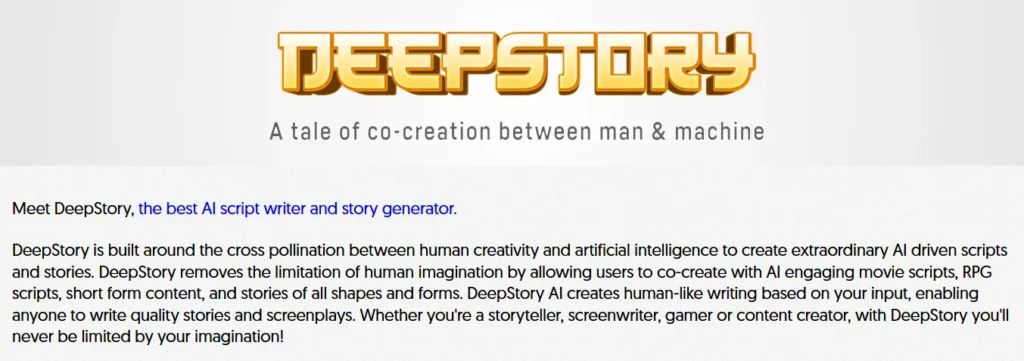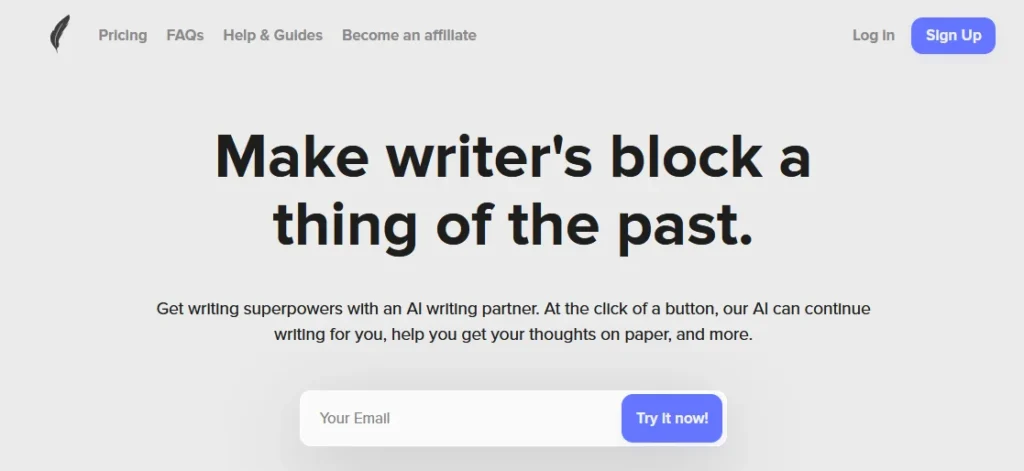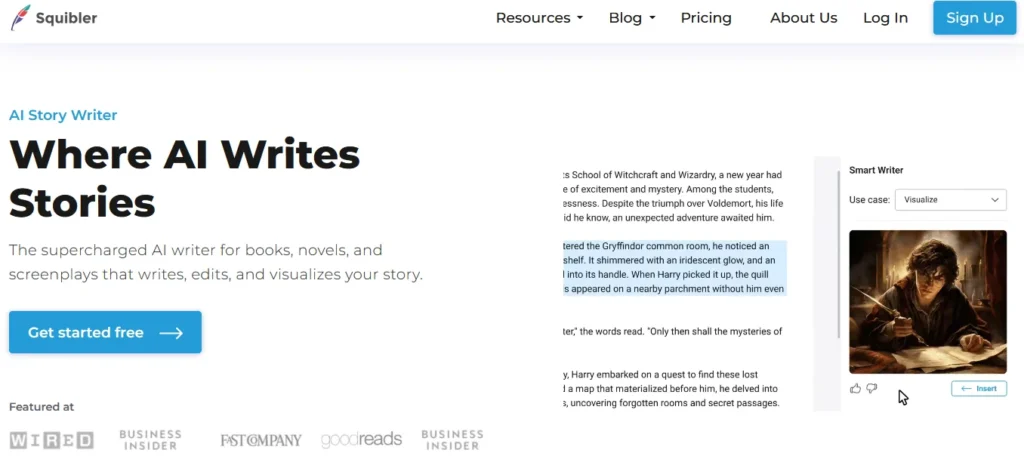Artificial intelligence (AI) has made incredible strides in recent years, and one of the most exciting applications is in AI story generation. AI story generators can help writers brainstorm ideas, develop plots and characters, and even generate full stories with just a few prompts. Here are 10 of the top AI story generators available today:
1. Sudowrite

Sudowrite is one of the most versatile AI writing assistants available today. Developed by AI research company Anthropic, it is designed to generate helpful, harmless, and honest content on virtually any topic.
Sudowrite is capable of producing high-quality writing up to 2,500 words in length. This makes it suitable for a wide range of long and short-form projects from articles to emails, stories, social media posts, and more.
The AI integrates advanced language models and training strategies focused on coherence, readability, and strong grammar/structure. This helps it craft polished, publication-ready text.
Sudowrite also provides customization around tone, voice, and creativity levels. Writers can tailor the AI assistant to fit the specific needs of different projects and genres.
As an invite-only beta product still in active development, Sudowrite shows immense promise in blending strong writing fundamentals with creative storytelling possibilities.
Key Features:
- Content Generation: Capable of generating content up to 2500 words.
- Quality Assurance: Ensures coherent, well-structured, and grammatically correct content.
- Customization: Allows users to set desired tone, voice, and creativity levels.
- Versatile: Suitable for various writing projects.
- User-Friendly Interface: Easy to use for writers of all levels.
- Collaboration: Supports multiple users working on projects together.
- Accessible in Beta: Available for exploration and use during its limited beta phase.
2. Plot factory

Plot Factory specializes in generating story ideas and narrative outlines. Also developed by Anthropic, Plot Factory utilizes AI trained in novels and screenplays to help writers develop compelling, logical plot structures.
The AI tool can create conflict-driven plots up to 500 words across genres including romance, sci-fi, mystery, and more. Writers can define key story elements like settings, characters, and themes to guide plot generation.
Plot Factory aims to provide writers with creative starting points to build upon in crafting stories. It is training in successfully published narratives lends it greater understanding of effective plot pacing and hooks to drive reader engagement.
For authors struggling to map out their latest book or screenplay, Plot Factory offers an intriguing idea generator to spur the creative process.
Key Features:
- Craft immersive worlds and characters
- Plan, organize, and write stories
- Mobile-friendly and writing stats tracker
- AI-powered narration
- Collaborative writing
- Innovative export options
- Character sheets
3. NovelAI

NovelAI provides end-to-end support for fiction writing from idea creation to final revisions. This subscription platform includes AI tools for plot/character development, contextual writing assistance, and editing capabilities.
The AI offers different generative and contextual writing modes. In generative mode, the AI attempts to independently continue writing based on earlier text and prompts. In contextual mode, the AI acts as an assistant focused on enhancing the coherency and flow of user-provided text.
Additional features include custom character profiles, story planning templates, and writing style/genre options. NovelAI caters to writers interested in AI collaboration throughout the creative writing process.
Key Features:
- Human-like writing
- Visualize stories with image generation
- Customizable text adventure module
- Accessible from anywhere
- Secure writing with encryption
- AI modules for style emulation
- Lorebook for world-building
4. Jasper

Where the previous tools focus on fiction narratives, Jasper specializes in non-fiction content writing. Developed by Anthropic as an open-source AI assistant, Jasper is designed to produce helpful, harmless, and honest text.
The AI can generate blogs, articles, emails, social posts, and other marketing copy up to 1,500 words in length. It crafts clear, readable text while actively checking for errors in grammar, tone, or logical inconsistencies.
Jasper demonstrates strong language adaptation skills. Writers can provide examples of existing content to fine-tune the AI to their brand voice and style.
For professional writers or marketers, Jasper streamlines researching and producing polished long or short-form non-fiction content. Its open-source access also allows for integration into other writing apps and workflows.
Key Features:
- Company Intelligence
- Campaign Acceleration
- Content Acceleration
- Performance Analytics & Insights
- Security & Privacy
- Integration with brands like Amplitude, Sentinel One, and Hubspot
5. Deepstory

Deepstory brings AI storytelling back to fiction with a focus on crafting short stories. The AI developed by Anthropic aims to produce logical, high-quality short stories of up to 2,000 words based on key prompts.
Writers can guide narrative generation by defining details like characters, settings, genres, and themes. The AI attempts to minimize repetition by actively tracking story, scene, and character details.
Deepstory provides tools to fully rewrite AI-generated paragraphs to better fit the author’s vision. Writers maintain full control to polish the final story.
For short fiction authors, Deepstory acts as an idea generator and co-writer for draft creation. Its rapid output helps authors push past writer’s block when struggling with new concepts.
Key Features:
- Cross-Pollination of Creativity
- Human-Like Writing
- Universal Usability
- AI Image Generation
- Collaboration features
- Enhanced export options
The Top 10 AI Recipe Generator for Effortless Home Cooking
6. Rytr

Rytr serves both fiction and non-fiction writers as an AI content generator and writing assistant. It focuses heavily on blog posts, articles, social media posts, and other marketing copy up to 10,000 words.
The platform provides robust editing and management features for refining AI-generated text. This allows writers to efficiently produce rough drafts of long or short-form content before polishing it themselves.
Rytr offers strong customization around the tone of voice. Writers can fine-tune the AI based on examples of existing on-brand content. The AI also provides optimization recommendations to enhance performance.
With its combination of draft generation, revision tools, and management features, Rytr aims to fully integrate into a range of professional writing workflows.
Key Features:
- Free forever plan with upgradeable features
- Impressive user base and ratings
- Content generation for various use cases
- Clean and minimalistic interface
- Collaboration and workflow management
- AI text expansion and refinement
7. ShortlyAI

ShortlyAI facilitates the vital writing skill of summarization. The AI digests input text across topics to create summaries retaining key facts, statistics, names, dates, and other important details.
Users can adjust the length of summaries generated to be anywhere from 5-35% of the original content length. This allows for rapid distillation of papers, articles, or documents down to only the most vital information.
ShortlyAI works for both English and Spanish content. The concise outputs simplify the absorption of research materials rapidly.
For non-fiction writers researching topics, ShortlyAI expedites gathering only the most salient information from various sources. The AI eliminates manual note-taking busywork.
Key Features:
- AI writing partner for overcoming writer’s block
- Content expansion and /or commands for refining text
- Clean and minimalistic interface
- Collaboration and team growth
8. Squibler

Squibler positions itself as an AI co-writer for fiction projects of all lengths. The tool provides detailed character profiles, settings, and plot outlines to jumpstart narrative development.
Writers start by establishing key story elements like genre, time, character biographies, and potential conflicts. Squibler’s AI then generates multi-page foundations incorporating the details.
Within the platform, writers can directly edit any AI-generated text to better fit their vision. The aim is to accelerate the plotting process so authors can focus on the nuanced crafting of narratives.
For fiction authors with a story premise but struggling to map out engaging characters and plots, Squibler collaborates on constructing detailed launch points.
Key Features:
- Story idea generation
- Character development
- Grammatically correct writing
- AI image generation
- Project management and collaboration
- AI-powered writing assistant
- Dark mode for comfortable writing
9. StoryLaB

StoryLaB focuses specifically on harmless fictional story generation up to 1,000 words. The AI developed by Anthropic integrates safety classifiers to minimize potentially harmful biases, stereotypes, or tropes within its narrative output.
Writers prompt story generation by defining core details like genre, setting, characters, and themes. The AI crafts brief stories while actively evaluating them against its internal safety checks.
Authors maintain full control to rewrite any portion of the AI-generated stories. The goal is creative story ideation that avoids relying on harmful societal assumptions or norms.
For writers prioritizing socially conscious fiction, StoryLaB collaborates on plots and characters in an inclusive, non-toxic manner. The safeguards provide peace of mind during ideation.
Key Features:
- Community of marketers for learning and growth
- Unlimited learning and AI content
- Bridging content and growth
- Streamlined content marketing
- Amplified social engagement
- Enhanced demand generation
- AI content creation tools
10. StoryAI

StoryAI bills itself as an interactive fiction co-writer. It assists authors in building story settings, characters, and branching plot outlines.
Writers can establish key details like time, location, character biographies, and potential conflicts. StoryAI proposes interactive fiction plot branches incorporating the prompts.
The tool also provides collaboration modes where authors can selectively approve AI-generated passages. This allows for iterative narrative development between human creativity and AI capability.
For fiction that requires adaptable, multi-path plots, StoryAI becomes both co-creator and organizer. It helps craft stories where choices dynamically alter story outcomes.
Key Features:
- Brainstorming ideas
- Generating unique stories in various genres
- Crafting characters
- Setting the stage and themes
- Special requests for personalized elements
- AI-assisted story creation
Choosing Your AI Storytelling Partner:
With an increasing array of AI fiction writing aids available, choosing the right one can feel overwhelming. Here are key factors to consider:
Your Goals: Do you simply want new story ideas and inspiration? Or a co-writer to create full drafts with? Identify which stage of the writing process you most need AI help.
Fiction vs Non-Fiction: Many AI story tools focus specifically on fictional narrative writing. Ensure the tool aligns with your genre.
Writing Style & Tone: Test tools using writing samples that exemplify your desired style. Verify the AI can accurately adapt your authorial voice before relying on it.
Length of Content: AI creative limits remain tied to computational power. If aiming for long-form stories, opt for tools proven to produce book-length manuscripts.
Editing Capabilities: Look for aids with built-in editing features to refine AI-generated text. The ability to rewrite or enhance content helps maintain creative control.
Cost: Pricing varies widely from free limited trials to monthly subscriptions. Weigh available features against costs to determine value.
Finding the ideal AI writing partner takes research and experimentation. However, the time invested can pay dividends in enhancing your skills as an author.
Final Thoughts on the Top AI Story Generators
AI story-writing tools offer exciting new possibilities for authors, game developers, marketers, and other creators. As the technology continues improving, AI story generators like these will likely become even more versatile, powerful, and commonplace.
With the right expectations and tweaking, AI assistants can help writers overcome creative blocks and expand the scope of projects. But human creativity, strategy, and editing are still essential to crafting truly great stories.